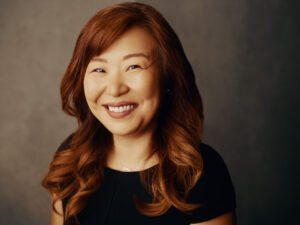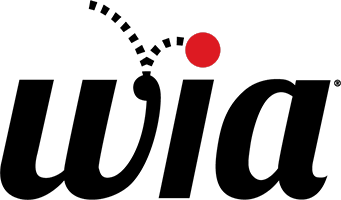WIA STORIES: Keika Lee

Meet Keika Lee, a dynamic force in the animation industry and a proud member of WIA Bay Area. As the founder of Greyscale Animation, she has quickly made a name for herself through critically acclaimed projects that highlight her creative vision and dedication to storytelling, including her short film “Oren’s Way,” recently tagged as eligible for voting in the Academy Screening Room for the Best Animated Short Category at the 97th Academy Awards. Lee attributes her success to hiring top talent, emphasizing a strong commitment to gender diversity, with 80% of her crew being women. Through her leadership, Greyscale Animation is setting a powerful example in the industry, showcasing how diverse perspectives can drive both artistic and business success.
Get to know Lee and more about her journey through our Q&A below.
What inspired you to pursue a career in animation? Was there a specific film, TV series, or experience that sparked your interest?
Disney’s animated masterpiece “Cinderella” sparked my interest in animation, specifically 2D animation. After seeing that film when I was 7 years old, I knew animation was what I was put on this Earth to do. I would draw to my heart’s content any and all my favorite animated characters and if I found a scene in a film that caught my attention, I would pause it frame-by-frame and draw each frame as practice to be an animator. Little did I know that what really interested me was what Walt Disney did, build a super team of creatives and a successful business in the animation industry. I wanted to create memorable and relatable characters just like he did and share the joy I felt as a 7-year-old with other children who watch my films.
What is your creative process when starting a new project? What is the first thing you do when an idea strikes?
I draw characters. I see them as my children who form right before my eyes. I believe strong characters make a strong story. As I’m drawing my next character, I almost wait until they tell me what their story is.
What are the things that inspire you? Which animators or filmmakers have influenced your work the most?
I am most inspired by creatives and filmmakers who take risks, never give up and surprise the world with their ideas. People like Charlie Chaplin, Hayao Miyazaki and Don Bluth, all of which created timeless characters to fall in love with.
Your animation studio, Greyscale Animation, shares the mission with WIA in empowering and supporting diverse representation in animation. Why is that important to you?
If you research “animation directors” or “influential animation leaders” you will see the vast majority of them are male. Not that that’s a bad thing, but it would be awesome if we could level that playing field with more talented women. Greyscale has a track record of hiring mostly female crew members, 80% of the film’s crew were female in fact. I don’t force the issue and look for female creatives, they actually come to me or I happen to think their style fits with our projects. Women have a unique perspective in life and we should have a stronger voice in the world of animation.
What do you look for when hiring creators?
I look for someone who is enthusiastic about the project I’m hiring for and the company. If they aren’t excited, then they will not do a good job. You have to love what you do in order to create something wonderful and genuine.
- What is the most challenging project you’ve worked on and how did you overcome those challenges?
My first film “Odd Dog” was the most challenging project because it was my first production under Greyscale. My first time running a business and a film at the same time without much help. I was the producer, director, writer, and art director for that film, and I had a small budget and limited resources. I also had to maintain my animation team’s morale for an entire year as they were working part-time and that’s a long production time for a 5-minute short! I approached things one day and a time, one step at a time. I wanted to get the film done and I knew if I just stayed the course, it would reach its goal.
How has the animation industry evolved since you began your career? What excites you the most about the future of animation?
Within the past 7 years as I was building my company, lots of things changed in the industry–2D software to create rigged animation, the pandemic increasing the amount of animations, YouTube blowing up, and, of course, the introduction of AI. What excites me the most is how all these disruptions are going to be handled or utilized. No one knows, and no one can predict the future. What we DO know is that things will never be the same.
How do you integrate new technology into your animation work?
We are pretty old school at Greyscale. The animation is hand drawn, and the development is similar to that of other animation studios. New tech doesn’t quite fit into our workflow or style.
Your short film “Oren’s Way” was eligible for voting in the Academy Screening Room for the Best Animated Short Category at the 97th Academy Awards. What was that process like? Do you have any advice for other animators who are trying to get Academy recognition?
We are very happy “Oren’s Way” is being considered for the Oscars, and it was a long journey. The toughest part is finishing the film, which took 3.5 years, and then applying to many film festivals, especially Oscar-qualified festivals. The best advice I can give any filmmaker is that the solution to fear is to take action. I read this in my favorite book by Dale Carnegie. Everyone can come up with a great idea, but it’s the ones who take action on those ideas and dreams who create and can take the journey into applying for the Oscars.
Is there a piece of advice you’ve received that’s been particularly helpful throughout your career?
Advice that has helped me a lot throughout my career is to not care what people think. That includes both yay-sayers and nay-sayers. Your worth comes from within you, not some outside force or validation. I am worthy of my successes and will celebrate each one with a pat on my back and a puff of my favorite cigar.
What is your advice for creatives of underrepresented gender identities looking to get into animation?
Don’t focus on your “disadvantages,” focus on your advantages and go for your dream! I think when anyone spends too much time thinking about why they can’t do something, it stops them from doing great things. I am an Asian American female and anyone can be like “wow, she is in for a tougher road” but that doesn’t stop me. I don’t view myself as an Asian American female, no. I am a filmmaker with great ideas to share.
How has WIA impacted you personally?
WIA is impactful for me because it’s comforting to know there is an organization that makes me feel empowered as a woman in the animation industry. I want to feel a sense of community with other women instead of competition. We all need to unite and stand up for diversity in animation and WIA inspires me to do so.
Why is an organization like WIA so important for people of underrepresented gender identities at all levels in their career journey?
WIA is very important because it reminds us how powerful underrepresented people really are. WIA supports this not only by existing but also by action with the panel talks, networking events and mentorship program. It also makes people aware that there is still an issue of an unbalanced industry that we are working on making more even. We need to help each other and support each other’s wins!





